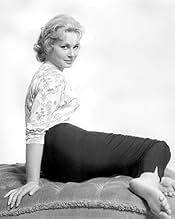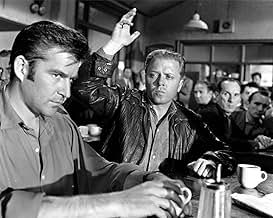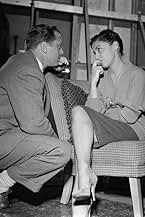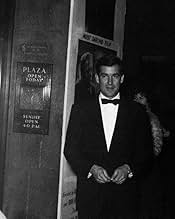IMDb RATING
7.2/10
1.8K
YOUR RATING
A young factory worker decides to stand up against his workmates and fellow union members when they want to hold a wildcat strike.A young factory worker decides to stand up against his workmates and fellow union members when they want to hold a wildcat strike.A young factory worker decides to stand up against his workmates and fellow union members when they want to hold a wildcat strike.
- Director
- Writers
- Stars
- Nominated for 1 Oscar
- 6 wins & 6 nominations total
- Director
- Writers
- All cast & crew
- Production, box office & more at IMDbPro
Featured reviews
This brilliant, deeply contentious film has largely been ignored over the years. It came out just as 'the kitchen sink' was kicking in and, although dealing with the working class, was very much an establishment film. It's right-wing and anti-Union and it quickly became very unfashionable to think highly of it. But dramatically, it's first-rate; it has the feel of those good BBC 'Plays for today' that came out in the sixties even if does leave a very bad taste in the mouth.
It's about a man sent to coventry for not supporting an unofficial strike. He's played by Richard Attenborough and it's a great piece of acting. As written, the character isn't developed in dramatic terms but Attenborough is wonderfully naturalistic. It's an intuitive performance; he gets inside the character's skin and thought processes. He's very moving.
There is very fine work, too, from Pier Angeli as his Italian wife. (Angeli was probably brought in to sell the film in America, and there's an easy-going, unforced quality to her acting that is very 'un-British'). And Bernard Lee is excellent as the dictatorial shop steward. The film also has an unfortunate Mephistopolean character in the form of an infiltrator. He's evil and cowardly and used in such a blatantly metaphorical way you can't be sure exactly what his purpose is. And being a political, Union bashing film you may feel uneasy watching it. But there are very fine. sustained dramatic sequences, too and it is utterly unsentimental.
It's about a man sent to coventry for not supporting an unofficial strike. He's played by Richard Attenborough and it's a great piece of acting. As written, the character isn't developed in dramatic terms but Attenborough is wonderfully naturalistic. It's an intuitive performance; he gets inside the character's skin and thought processes. He's very moving.
There is very fine work, too, from Pier Angeli as his Italian wife. (Angeli was probably brought in to sell the film in America, and there's an easy-going, unforced quality to her acting that is very 'un-British'). And Bernard Lee is excellent as the dictatorial shop steward. The film also has an unfortunate Mephistopolean character in the form of an infiltrator. He's evil and cowardly and used in such a blatantly metaphorical way you can't be sure exactly what his purpose is. And being a political, Union bashing film you may feel uneasy watching it. But there are very fine. sustained dramatic sequences, too and it is utterly unsentimental.
This film doesn't seem to be very well known but it has a lot to offer.
I've seen 50s/60s comedies based around factories but I can't remember many serious dramas like this. The plot holds few surprises but that leaves plenty of room for us to judge the acting, and I'd say it's consistently good. Richard Attenborough and Pier Angeli are a great combination as the young married couple - it's a shame Pier made so few films in English.
A lot of scriptwriters could do worse than watch this film and learn its lessons about how to tell a story in 90 minutes. And this is a good film for classroom use - leads nicely into a discussion of peer pressure and bullying.
I've seen 50s/60s comedies based around factories but I can't remember many serious dramas like this. The plot holds few surprises but that leaves plenty of room for us to judge the acting, and I'd say it's consistently good. Richard Attenborough and Pier Angeli are a great combination as the young married couple - it's a shame Pier made so few films in English.
A lot of scriptwriters could do worse than watch this film and learn its lessons about how to tell a story in 90 minutes. And this is a good film for classroom use - leads nicely into a discussion of peer pressure and bullying.
Guy Green's (1960) film of Bryan Forbes' screenplay is based on a treatment by Michael Craig and, brother, Richard Gregson. Set in London in the late 1950's it was the first release of the joint venture production company Beaver Films set up by Bryan Forbes and Richard Attenborough.
As the film opens, we join Tom Curtis (Richard Attenborough) at work in a small engineering factory beset with labour problems. Single-minded and fiercely independent, Curtis is slow to grasp the implications of the fomenting unrest among his workmates as they band together to challenge the management head-on in a dispute that ultimately leaves Curtis out in the cold.
We follow Curtis home at night where his workmate Joe Wallis (Michael Craig - also writer) lodges with Curtis, his wife Anna (Pier Angeli) and their young family.
But as industrial relations deteriorate at work we see Curtis becoming increasingly isolated and intimidated by his determined colleagues.
With solid performances from Bernard Lee (Bert Connolly), Geoffrey Keen (Davis) and Alfred Burke (Travers) as the sinister agitator, the audience sees Curtis left high and dry as even the management feel compelled to abandon him.
Increasingly out of his depth, we are drawn into Curtis' worsening situation as his family are also intimidated in an effort to break his indomitable will.
This film captures something of the early struggle for recognition by employees in small firms like this before employment protection became enshrined in the law of the land. It gives us a feel for the situation of the casualties along the way and the forces at play.
As the film opens, we join Tom Curtis (Richard Attenborough) at work in a small engineering factory beset with labour problems. Single-minded and fiercely independent, Curtis is slow to grasp the implications of the fomenting unrest among his workmates as they band together to challenge the management head-on in a dispute that ultimately leaves Curtis out in the cold.
We follow Curtis home at night where his workmate Joe Wallis (Michael Craig - also writer) lodges with Curtis, his wife Anna (Pier Angeli) and their young family.
But as industrial relations deteriorate at work we see Curtis becoming increasingly isolated and intimidated by his determined colleagues.
With solid performances from Bernard Lee (Bert Connolly), Geoffrey Keen (Davis) and Alfred Burke (Travers) as the sinister agitator, the audience sees Curtis left high and dry as even the management feel compelled to abandon him.
Increasingly out of his depth, we are drawn into Curtis' worsening situation as his family are also intimidated in an effort to break his indomitable will.
This film captures something of the early struggle for recognition by employees in small firms like this before employment protection became enshrined in the law of the land. It gives us a feel for the situation of the casualties along the way and the forces at play.
A film which shows how Britains factories worked in the 50s,a place which employs thousands of people,usually on low wages.The workers only protection is their union which of course is only fair.Then the union is taken over by a few dedicated socialists who then are manipulated by the far lft. .Everything that happens in this film is true to life,and shows that adults soon behave like spoilt children when they don't get there own way.The rights of the individual are soon gone,violence and bullying follows,the film ask questions and leaves you asking your self questions at the end.Well worth a watch 8/10
I saw this film in my first year in law school in New York in 1991. A prior comment calls the film "right wing." Unfortunately, given the subsequent events in Britain in the 1970s and contemporary events in Detroit right now, it is prescient. Lord Attenborough's character faces a labor high noon many encounter in a union shop. One older worker in the film wants only to make a product that he is proud of. A pride that forces in the union movement obstruct. Anyone compelled to join a union by organizers who hire on only to unionize, will appreciate this film. I know. I've been there -- twice. White collar and blue collar jobs. That the film was made at all is amazing. But this often grim picture does have a comedic sibling -- the equally brilliant I'M ALL RIGHT JACK with Ian Carmichael and Peter Sellars. See both and you will understand what happened to Britain as well as too much of industrial America. If corporate greed has a partner, it is union executives who throw their members under a bus to save their jobs. THE ANGRY SILENCE should be required viewing for anyone who believes that political films -- not politicized films -- have a place in Hollywood. Heartbreaking story, economic direction, and brilliant acting. In dramatic black and white. The screenplay won a BAFTA Award for Bryan Forbes.
Did you know
- TriviaThis movie was initially banned in certain parts of Wales, as several cinemas were controlled by the miners' unions at that time. It was only when Richard Attenborough personally intervened and screened it for the union leaders that the ban was revoked.
- GoofsThe girl lying on the grass with the motorcyclist is flat on her back on the grass then the shot changes and she has her head raised with her head using a tree trunk as a pillow.
- Quotes
Tom Curtis: Shut up! Shut up will you! You don't have to worry about not talking to me. I don't want you to talk to me, do you hear? But you stay away from my family. Just stay away from us!
- ConnectionsFeatured in Film Review: Richard Attenborough (1968)
- How long is The Angry Silence?Powered by Alexa
Details
Box office
- Budget
- £98,000 (estimated)
- Runtime
- 1h 35m(95 min)
- Color
- Aspect ratio
- 1.66 : 1
Contribute to this page
Suggest an edit or add missing content



































